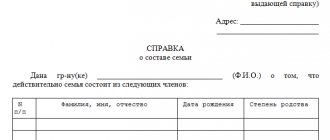Home » Inheritance » Is a sister entitled to her brother’s inheritance?
18
Can a sister inherit the property of a deceased brother? Yes, under certain circumstances.
To realize her inheritance rights, certain conditions are required. They do not always arise, because in addition to the sister, many heirs can claim to receive the property of the deceased. To find out what place she occupies among them and what actions she should take in the event of a call to succession, you need to understand the general principle of inheritance and the key features of its implementation.
The information presented below is relevant not only for the sister, but also for the brother, since their legal status in inheritance is equal from the point of view of the law.
Inheritance by law half-sister
Attention
Right of inheritance According to the law, those persons who are alive at the time of the death of the testator have the right to inherit the property of the deceased. Children who were born alive at the time the will was opened and who were conceived during the lifetime of the testator. The principle of sequence Over many centuries, humanity developed laws that were adjusted in parallel with the flow of time.
And in our time, laws about inheritance have been so polished, but this has not made litigation less frequent. The law establishes the order of succession. There are 8 queues. Each of them goes in descending order of degree of relationship. For a general concept, consider 2 of them:
- The first priority includes the closest relatives – children, spouses, parents.
By the way, children born in an unregistered marriage are full heirs, provided that the testator, upon application, considers himself the father of the child.
The law establishes seven lines of inheritance as permanent, and one additional, designed for disabled dependents, if the deceased had any.
Inheritance lines are built on the principle that the closest people inherit first, and then as the proximity of the relationship decreases. First of all, direct relatives in direct ascending (parents) and descending lines (children), as well as surviving spouses who were in a relationship officially registered with the registry office, inherit.
Adoptive parents and adopted children are equated within the meaning of the law to biological relatives and inherit in the general manner.
The grandchildren of the testator can also be involved in entering into the inheritance, but only if their parents (children of the testator) have also already died.
If there was no one at the first stage who would accept the inheritance, the right to receive the inheritance passes to the next stage.
“There was no one” does not always mean that relatives are actually absent. If they are found unworthy according to the rules of Article 1117 of the Civil Code of the Russian Federation or refuse to enter into an inheritance, then this is also a reason for the right to enter into an inheritance to be transferred to the heirs of the second priority.
Heirs of the first stage without a will
Registration of inheritance after the death of brothers and sisters Article 1152 of the Civil Code of the Russian Federation contains provisions regarding the acceptance of inheritance. It follows from them that:
- it is necessary to accept the inheritance to acquire it;
- You can only accept the entire share due, and not part of it. If there are several grounds for accepting an inheritance, it is permissible to accept a share on one basis, on several or all of them;
- you can refuse the inheritance;
- the inheritance is considered to belong to the heir from the date of opening of the inheritance, regardless of when it was actually accepted.
Accept the inheritance, according to Art. 1153 of the Civil Code of the Russian Federation, it is possible either actually (by paying taxes, starting to manage property, protecting it), or by submitting an application to a notary. The application must be submitted within six months from the date of opening of the inheritance.
Where are the brothers and sisters in line for inheritance?
Secondly, according to the provisions of Article 1143 of the Civil Code of the Russian Federation, the following are involved in inheritance:
- grandparents (paternal and maternal);
- sisters and brothers (both full and partial kinship with the testator).
Brothers and sisters, being relatives of the collateral line, can receive an inheritance either if they are indicated in the will, or in the case of inheritance by law, if there were no persons who would accept the property at the first inheritance circle.
The completeness of the relationship will not have legal significance - they can be either full-blooded (if they have both parents in common) or half-bred (when there is only one common parent).
According to Article 71 of the Family Code of the Russian Federation, if parents were deprived of parental rights in accordance with the procedure established by law, this does not affect the inheritance rights of brothers and sisters - they remain heirs of the second priority. But the “disenfranchised” themselves, on the basis of the above-mentioned Article 1117 of the Civil Code of the Russian Federation, are recognized as unworthy heirs and do not receive an inheritance for their children.
In practice, the question of half-brothers and sisters is also often encountered.
If a man and a woman remarry, and if they both have children from previous marriages, then the latter become each other's half-siblings. Such children should not be confused with half-siblings who are related through one common parent.
If they have a common father, they are half-sisters and brothers, and if they have a common mother, they are half-sisters. Such individuals have a biological relationship through one parent. But half-sisters and brothers have no blood relationship; the most that connects them is the family relationship of their parents, who act as stepfather and stepmother for them.
According to the Civil Code of the Russian Federation, the stepfather and stepmother are the heirs of the seventh line, but half-brothers and sisters do not inherit from each other. But there is an exception to this rule. If remarried persons adopt children of their second spouses, they will be considered equal to their biological parents. The adoptive parents will be the heirs of the first stage.
The same rule will be extended to brothers and sisters - parents are equal in status after adoption to parents by blood, and brothers and sisters are equal to relatives. That is, if a half-brother or sister was adopted by the testator's parent, then they become second-order heirs. If there was no fact of adoption, then inheritance rights do not arise.
Can a half-brother claim an inheritance?
As for marriage relations, in order to enter into an inheritance, the spouse must be legally married to the one who transfers his inheritance. Parents have the right to inherit unless they have been legally excluded from the right to inherit.
- Second-order heirs include full and half-siblings, grandparents, regardless of side (mother or father). Heirs of the second stage are in the absence of heirs of the first stage.
- Nuances that arise when entering into an inheritance.
Often, legal proceedings in such matters are very complex and can drag on for a long time. Since each case is unique, there is no one template when trying a case when disputes arise when dividing an inheritance: For example, citizen P. must enter into the inheritance that was bequeathed to him by his own father.
We suggest you familiarize yourself with: Theft of weapons, subject and sides of the crime
Full and half siblings
The brother was registered in this house. There is no will. My stepbrother’s parents (our common father and his mother) lived in a civil marriage, and mine were legally married. The house is the jointly acquired property of my father and his mother No. 204519. April 23, 2011 at 10:29 am Hello, Elena Aleksandrovna. Well, if he doesn’t have children or a wife, you have them, just like his nephews. Article 1141.
The heirs of each subsequent order inherit if there are no heirs of previous orders, that is, if there are no heirs of previous orders, or none of them has the right to inherit, or all of them are excluded from inheritance (Article 1117), or are deprived of inheritance (clause 1 of Article 1119), either none of them accepted the inheritance, or all of them renounced the inheritance. 2.
So, in the absence of a will, the grandmother’s property, by law, must pass to the heir of the first priority, which includes the granddaughter. And the brother, even if he took care of his sister, has no right to housing. There is also a second side to this situation, when the grandmother left a will in favor of her brother.
In this situation, the granddaughter can challenge the will and inherit part of the grandmother’s apartment. Inheritance can be entered into no more than 6 months from the date of death of the testator. The law does not give priority to full or half-siblings; these persons have the same rights when receiving an inheritance.
Cousins are already heirs of one of the last lines. If a will was written in their favor, they can inherit. Unless, of course, no one else expresses a desire to compete for this inheritance.
Right of refusal
In addition to the right to receive the testator's property, the successor has the right to renounce it. It may be useful in case of absolute unprofitability of inheritance or in other circumstances prompting the heir to refuse.
To renounce an inheritance, it is enough to draw up a statement and bring it to the notary at the place of last residence of the now deceased or at the place where the inheritance case was opened (if paperwork on it has already begun). In this case, the applicant can be either the objector himself or his official representative (legal or voluntary). The application can also be submitted in two ways: in person or by mail. But in the latter case, it is recommended that the postal item be issued by registered mail, and the signature on the waiver must be certified by any available notary.
The right of refusal may become an opportunity to transfer the inherited property to another successor. This is called a directed failure and for it to occur certain conditions must be present:
- Lack of designated heirs (under the will).
- The presence of intestate property.
- Direction in favor of successors by law (regardless of the order) or by will, or those who are called upon to receive the material benefits of the deceased by right of representation or by way of transmission.
- The subject of the waiver is not a mandatory inherited share.
When exercising his right to refuse, the heir must remember that:
- it will no longer be possible to take it back;
- You can refuse even after accepting the inheritance;
- renunciation is made of all property (you cannot select a separate object or obligation);
- The refusal is given six months from the date of death of the testator; later it is accepted only in the case of actual succession and if there are good reasons for the omission.
When resolving issues of succession, it is important for the testator’s sister to remember the relevance of competent legal assistance. An experienced specialist is able to prevent many risks and significantly simplify the inheritance procedure, and, if necessary, refusal. You can obtain such support by contacting our lawyers. They will answer the question submitted through the electronic form of the ros-nasledstvo.ru portal free of charge and at the right time for you.
FREE CONSULTATIONS are available for you! If you want to solve exactly your problem, then
:
- describe your situation to a lawyer in an online chat;
- write a question in the form below;
- call Moscow and Moscow region
- call St. Petersburg and region
Save or share the link on social networks
- FREE for a lawyer!
Write your question, our lawyer will prepare an answer for FREE and call you back in 5 minutes.
By submitting data you agree to the Consent to PD processing, PD Processing Policy and User Agreement
Useful information on the topic
4
How to restore the missed deadline for accepting an inheritance
The law limits the period allotted for accepting an inheritance to 6 months from...
12
How to prove and confirm relationship with the deceased
The presence of family ties is the main condition for a calling to inheritance...
31
How to challenge a will for an apartment?
According to Article 62 of the Civil Code of the Russian Federation (Civil Code of the Russian Federation), citizens...
55
How to properly draw up and write a will
The provisions on the will are contained in the third chapter of the Civil Code of the Russian Federation. According to…
99
Heirs of the first stage
The Civil Code of the Russian Federation defines two options for inheritance: by will and...
21
Inheritance of a privatized apartment after the death of the owner by law and will
After privatization, the apartment used on the basis of a social tenancy agreement passes...




